Germany has announced a substantial investment of €35 billion ($41 billion) over the next five years to significantly enhance its military space capabilities. The funding is intended to protect the nation's critical satellite infrastructure from increasing cyber and physical threats, a move defense officials describe as essential for national security.
The strategic plan was detailed by Defence Minister Boris Pistorius, who identified the growing activities of nations like Russia and China as a primary driver for this major defense initiative. The investment aims to build a more resilient and independent space presence for the German military.
Key Takeaways
- Germany will invest €35 billion over five years to bolster its defense capabilities in space.
- The plan focuses on protecting satellites from cyberattacks and physical threats.
- New reconnaissance, communication, and early warning satellite constellations are planned.
- The initiative emphasizes partnerships with both large companies and smaller tech startups.
Addressing Space Vulnerabilities
During a speech at the Federation of German Industries’ Space Congress in Berlin, Defence Minister Boris Pistorius highlighted the critical role of satellites in modern society. He described this infrastructure as a significant point of vulnerability for any advanced nation.
"Satellite networks today are an Achilles’ heel of modern societies. Whoever attacks them paralyzes entire nations," Pistorius stated on September 25th.
The minister referenced specific incidents to illustrate the current threat landscape. He pointed to a Russian cyberattack in February 2023 that targeted Viasat satellites. This event had direct consequences for Germany, temporarily disrupting the operation of some of the country's wind turbines that relied on the network for communication.
Monitoring Adversary Activities
Beyond cyber threats, Pistorius also mentioned physical activities in orbit that have raised concerns. He noted that Russian Luch/Olymp satellites have been observed operating in close proximity to Intelsat spacecraft, which are utilized by the German military for communications. This practice, often referred to as shadowing, is seen as a potential threat to sensitive military assets.
What is Space Situational Awareness?
Space Situational Awareness (SSA) involves tracking objects in orbit and predicting their future positions. For military purposes, this includes monitoring satellites, debris, and potential threats. Enhanced SSA allows a nation to protect its own assets, anticipate hostile actions, and maintain a clear picture of the space domain.
A Comprehensive Defense Strategy for Space
The €35 billion investment will fund a multi-faceted strategy to create a robust defense posture in space. The plan focuses on developing new technologies and infrastructure under the direction of the Bundeswehr Space Command, Germany's military branch for space operations.
Key components of the initiative include the development of new satellite constellations designed for specific military functions. These will cover reconnaissance, communications, and early warning systems to detect missile launches or other hostile actions.
Fact: The German military, the Bundeswehr, established its dedicated Space Command in 2021, signaling a growing focus on space as a distinct operational domain alongside land, sea, air, and cyber.
Building Resilience and Redundancy
A central goal of the investment is to make German space assets more resilient. This will be achieved through several interconnected measures:
- Hardened Systems: Satellites and ground stations will be engineered to better withstand both cyber intrusions and potential physical attacks, such as jamming or directed energy weapons.
- Improved Surveillance: New ground-based radar and telescope networks will be built to enhance Germany's ability to monitor objects and activities in orbit independently.
- Sentinel Satellites: Germany plans to deploy dedicated satellites whose primary mission is to patrol orbits and inspect or monitor other spacecraft, providing early warning of threats.
- Redundant Constellations: By building overlapping satellite systems, the military can ensure that critical capabilities remain operational even if some satellites are disabled or destroyed.
Pistorius emphasized that these upgrades are part of a long-term vision. "We are building structures within the Bundeswehr to enable us to effectively defend and deter in space in the medium and long term," he said.
Fostering a Domestic Space Industry
The German government intends for this investment to stimulate its domestic space and technology sectors. The strategy involves creating opportunities for a wide range of companies, from established aerospace giants to innovative startups.
"We want to promote innovations from small and medium-sized enterprises in the future in a non-bureaucratic and early stage — and use larger companies as system integrators to integrate small businesses and startups," Pistorius explained.
This approach aims to leverage the agility of smaller companies while relying on the experience of larger firms to manage complex, large-scale projects. Several key industrial partnerships are already active and contributing to Germany's space capabilities.
Ongoing Modernization Projects
Several projects are already underway that align with this new strategic direction:
- SATCOMBw Stufe 3: Arianespace has been contracted to launch two next-generation communication satellites using its new Ariane 6 rocket. These will replace Germany's aging COMSATBw 1 and 2 satellites.
- Planet Labs Pelican Constellation: Following a government-backed deal worth €240 million, Planet Labs Germany GmbH will start producing its advanced Pelican high-resolution imaging satellites within Germany.
- SARah Radar Satellites: OHB, the country's largest space contractor, is continuing the expansion of its SARah constellation. These radar satellites provide all-weather, day-and-night imaging and are replacing the older SAR-Lupe system.
Shifting the European Balance of Power
This significant financial commitment is seen by industry experts as a move that could alter the dynamics of space power in Europe. Historically, France has been considered the continent's leading military space power, but Germany's investment signals a clear ambition for greater autonomy.
Caleb Henry, an analyst at Quilty Space, commented on this trend, noting that Berlin is actively working to reduce its reliance on allies for critical space services. "It’s the culmination of a growing desire in Germany for greater space autonomy, and a willingness to pursue that, if necessary, on an independent basis," Henry said.
He also pointed out that Germany has explored the possibility of developing its own Medium Earth Orbit (MEO) satellite constellation, which would represent another major step toward sovereign space systems. This push for independence reflects a broader European trend of strengthening national defense capabilities in response to a changing global security environment.





